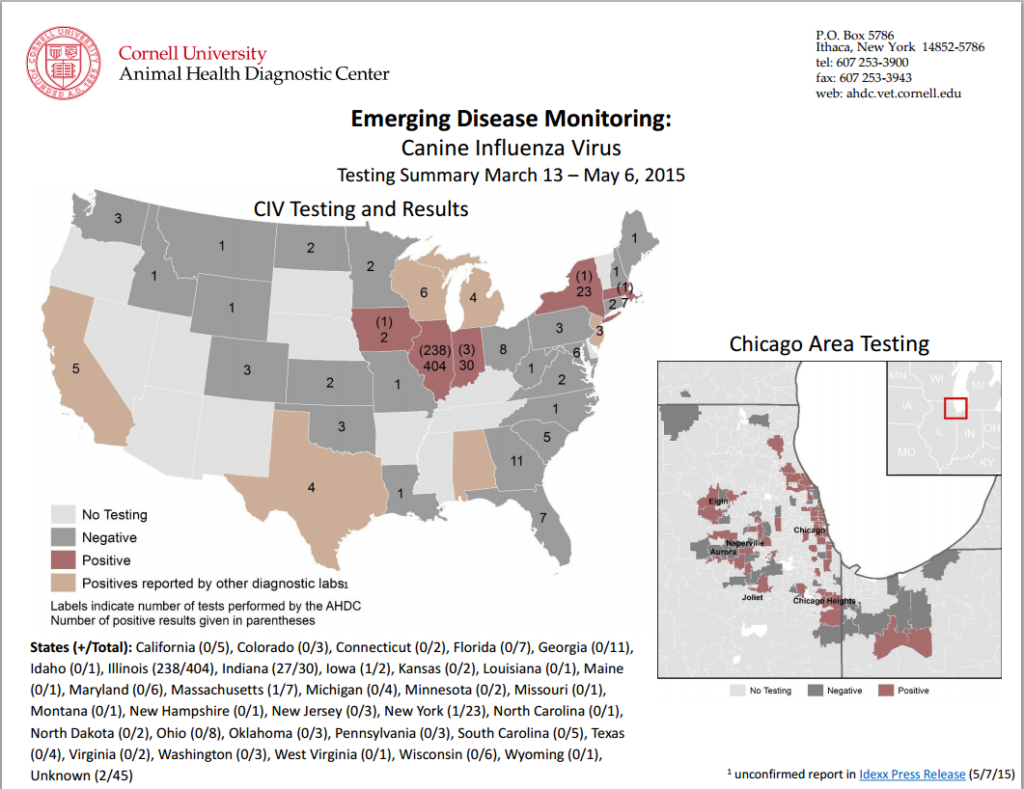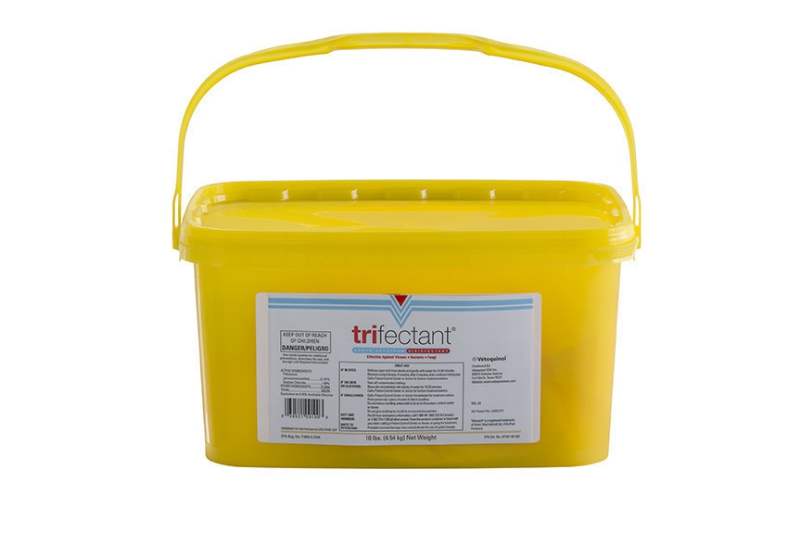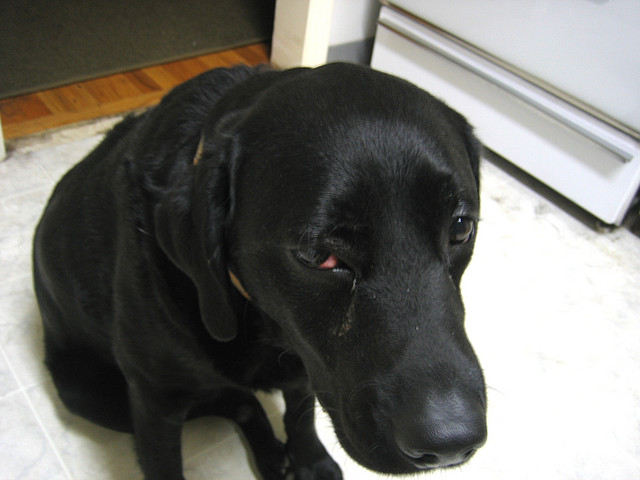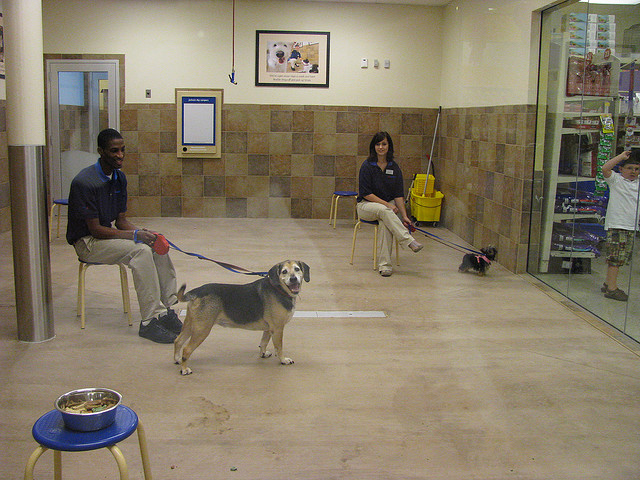Since the Chicago outbreak in April of what was originally being called simply a “rare canine infectious respiratory disease (CIRD)” (now known as H3N2 virus), this potentially deadly #dogflu is spreading rapidly to other states. For more information on cases in your state, check out this information from Cornell University’s Animal Health Diagnostic Center
Aside from Illinois, outbreaks have been confirmed in:
- Georgia
- Ohio
- Alabama
- California
- Texas
- Massachusetts
- New York
- Wisconsin
- Michigan
- New Jersey
- Iowa
- Indiana

The latest news report from USA Today says thousands of dogs are thought to be sick, with at least eight deaths recorded at this time.

The latest is a 13-week-old West Highland Terrier puppy in Newark, Ohio, who tested positive for H3N2 just last week.
The concern is that this puppy came from a breeding facility with over 130 breeding adult dogs and we don’t know where all the puppies went, explains Ohio veterinarian, Jodi Houser who treated the Westie puppy.
How Concerned Should You Be?
It is definitely an epidemic, vets says, but it’s not something people should panic about.
It’s important note that this is a different strain from the flu outbreak of 2004, which is what the current vaccines prevent against.
Pharmaceutical companies are working on creating a vaccine for the new strain, but they don’t expect it to be ready for another four to six months.
A Pound of Prevention
While the vets say to not panic, it doesn’t hurt to be cautious. Don’t allow your dog to greet other dogs, keep them on a short lead and make sure you wash your hands after coming in contact with another dog – you can spread it your own.
As a reminder, here are symptoms to watch for:
- Persistent and lingering cough
- Lethargic behavior
- Poor appetite
- Fever
Learn more about H3N2 from this University of Georgia Fact Sheet.
And while there isn’t a vaccine yet, there are cleaners that can kill the virus.
Tomlyn, makers of pet health and wellness products, is monitoring the supply and availability of Trifectant®, a broad-spectrum disinfectant capable of killing 99.9 percent of major viral, bacterial and fungal pathogens, including those that cause canine flu.

“While canine flu isn’t new, it mutates just like human flu,” said Dr. Brian McLaughlin, a Tomlyn veterinarian. “This strain isn’t protected by an existing vaccine because it’s never been seen in the U.S. That’s why it’s dangerous and important to prevent.”

The virus has an incubation period of one to three days, but infected dogs can be contagious for up to two weeks. Symptoms include coughing, nasal discharge, fever and loss of appetite. It is currently not a threat to humans.
The virus most commonly spreads through close contact between dogs at daycare centers, boarding facilities, dog parks and similar “crowded” areas. According to McLaughlin, facilities should aim to prevent the virus’ spread by properly disinfecting with a product like Trifectant. It mixes with water for a ready-to-use solution that is safe for humans and animals, biodegradable and effective at killing pathogens that cause canine flu, parvovirus and other diseases that can affect dogs, cats, horses or other animals.
Trifectant is available over-the-counter from Jeffers Pets, Doctors Foster & Smith, Healthy Pets and a variety of local retailers.
(H/T: USAToday.com)
Original article (posted April 11, 2015)
The Cook County Department of Animal and Rabies Control (CCDARC) is cautioning dog owners in the Chicago area after a rare canine infectious respiratory disease (CIRD) epidemic has taken the lives of five dogs and sickened over 1,000 others.
ABC Breaking US News | US News Videos
Cases have been found in three states – Illinois, Wisconsin, and Indiana.
In the statement released by CCDARC:
Dr. Donna Alexander, CCDARC administrator, said voluntary reporting to the Department of disease surveillance conducted by veterinarians has identified more than 1,000 cases of CIRD, or canine flu, unrelated to “kennel cough”, as well as five fatalities. CIRD is distinguished from kennel cough by its severity, possible consequences and diagnostic confirmation.
The age of the animals showing CIRD symptoms vary, but more severe forms are being seen in dogs under 1 year of age and greater than 7, she said.

Symptoms include:
- Persistent and lingering cough
- Lethargic behavior
- Poor appetite
- Fever
If you observe or suspect your dog may be suffering from any or all of these symptoms, the animal should be seen by a veterinarian, Dr. Alexander said.

Additionally, she recommended that until incidents of the disease diminish, dog owners should avoid pet friendly areas such as dog parks, not allow their dogs to play with other dogs, avoid group dog training activities, and, if possible, not board their pets. Dogs can be contagious even if they are not showing any of the CIRD symptoms, Dr. Alexander said.
While CIRD is highly contagious for dogs, it is not contagious for humans or other household pets such as cats. However, the virus that causes CIRD can live on fabrics and hard surfaces and can be transmitted from person to dog if the person has come into contact with a dog carrying the virus. To avoid such transmission, Dr. Alexander recommends thorough hand-washing after touching or petting a dog.
A vaccine that counters CIRD is available and can be administered by a veterinarian. This vaccine is separate from the kennel cough vaccine.
(H/T: ABCnews.com)
